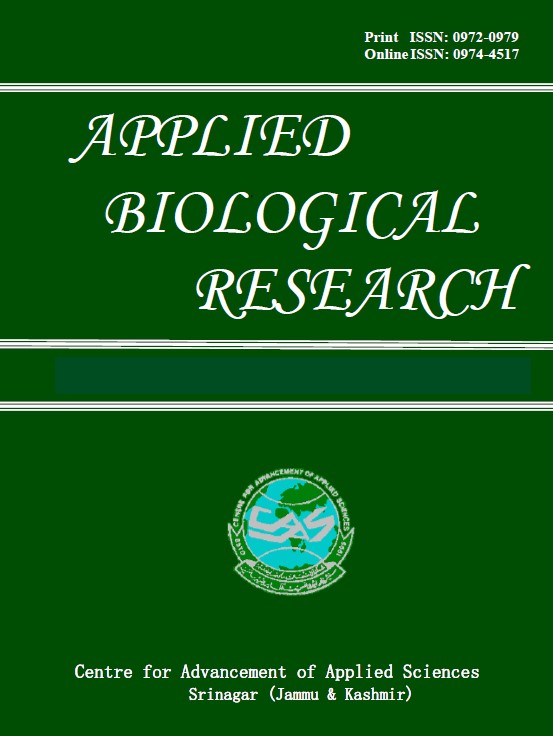Haematinic Effect Of Hygrophila Spinosa On Induced Anaemic Rats
DOI:
https://doi.org/10.48165/Keywords:
Anaemia, haematinic, Hygrophila spinosa, pre-flowering extractAbstract
The present study was conducted to assess the haematinic property of Hygrophila spinosa extract in induced anaemic albino rats with phenylhydrazine. The haematinic activity of orally administered H. spinosa extract (pre-flowering extract @ 40 mg kg-1 body weight) and powdered aerial part (@ 40 mg extract kg-1 body weight) was assessed by treating the induced anaemic rats for 30 days. Treatments ameliorate the anaemic condition by improving haematological parameters and RBC indices. On 30th day post-treatment, the rats treated with plant extract showed more improvement in anaemic condition and increase in body weight in comparison to the rats treated with crude leaf.
Downloads
References
Anonymous. 2002. The Wealth of India - A Dictionary of Indian Raw Materials and Industrial Products, Supplement Series. Raw Materials, Volume 3, p. 319, Council of Scientific and Industrial research, New Delhi, India.
Berger, J. 2007. Phenylhydrazine haematotoxicity. Journal of Applied Biomedicine, 5: 125-130. Biswas, K. and Ghosh, E. 2002. Bhaatio-Banoshoi, Vol. III, University Calcutta Press, Calcutta, West Bengal, India.
Burkhard, M.J., Brown, D.E., McGrath, J.P., Meador, V.P., Mayle, D.A. and Keaton, M.J. 2001. Evaluation of the erythroid regenerative response in two different models of experimentally induced iron deficiency anaemia. Veterinary Clinical Pathology, 30: 76-85.
Dasgupta, S.C., Gomes, A. and Das, M. 2001. Haematinic effect of Hygrophila spinosa T. Anderson on experimental rodents. Indian Journal of Experimental Biology. 39: 381-382. Jain, N.C. 1990. Schalm’s Veterinary Haematology (4th edn.) K.M. Verghese Co., New Delhi, India. Kirtikar, K.R. and Basu B.D. 2005. Indian Medicinal Plants, Vol. III, International Book Distributors, Dehradun, India.
Oudhia, P. 2003. Hygrophila spinosa: White Flowered Variety; Medicinal Weed; Weed; www.botanical.com/site/column_poudhia/01_white_flowered.html - 10k.
Pennix, B.W., Pahor, M. and Cesari, M. 2004. Anaemia is associated with disability and decreased physical performance and muscle strength in the elderly. Journal American Geriatric Society, 52: 719-724.
Redondo, P.A., Alvarez, A.I., Diez, C. Fernandezrojo, F. and Prieto, J.G. 1995. Physiological response to experimentally induced anaemia in rats - A comparative study. Laboratory Animal Science, 45: 578-583.
Snedecor, G.W. and Cochran, W.G. 1967. Statistical Methods (6th edn.), Oxford and IBH, New Delhi, India.
Viollier, E. 2009. The ferrozine method revisited: Fe(II).Fe(III) determination in natural waters. Applied Geochemistry, 15: 85-790.

